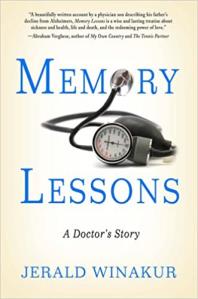
I’m an admitted insomniac and a voracious reader. Thankfully, I can combine the two habits so that I can at least be productive during my periods of insomnia. I picked up Dr. Winakur’s book last night, and finished it by morning. Oh, I did get a few hours of sleep in between chapters.
Dr. Jerald Winakur, a seasoned geriatrician, writes a series of essays reflecting on his medical career and on the physical and mental decline of his father from Alzheimer’s disease. Dr. Winakur is a medical professional who treats the old-old, defined as those over the age of 85, but he is also a son facing the uncertainty of dealing with his old-old father’s declining mental and physical capacities. A son who, although not legally his father’s physician, is his father’s surrogate decision-maker. Dr. Winakur exposes the human side of a physician - the side where the scientist and trained professional meets the man with doubts about the efficacy of the treatments prescribed for patients and the man with concerns about the ethics of those treatments. Dr. Winakur struggles with the lessons he learned early in his career – to keep the patient alive – with his life lessons. Those life lessons teach that sometimes it is better to let the patient go.
Those caring for loved ones with dementia will likely recognize the feelings of guilt and uncertainty that come with the day-to-day care of someone who no longer recognizes the caregiver. They will empathize with the family’s agony over deciding where the loved one should live, what treatments should be authorized, how to react to the repeated questions and how to deal with the endless wanderings in the night.
Dr. Winakur also exposes some of the flaws in the medical profession, and ties many of those flaws to the system by which physicians are compensated. He raises concerns about the rising number of specialists who are well compensated for procedures, and the stingy compensation afforded family practice physicians, internal medicine specialists and geriatricians who are responsible for using their reasoning skills to diagnose and treat most of the nation’s patients. Specifically, he lays the blame on the Medicare system of reimbursement, the rates determined by a board of physicians heavily weighted with specialists earning their living by doing procedures on patients.
I recommend this book to those caregivers beginning their journey with the loved one with Alzheimer’s disease, for they can learn what may come. I also recommend this book for those who are at the end of the journey, for they can find a kindred soul.
Memory Lessons by Dr. Jerald Winakur is available on Amazon